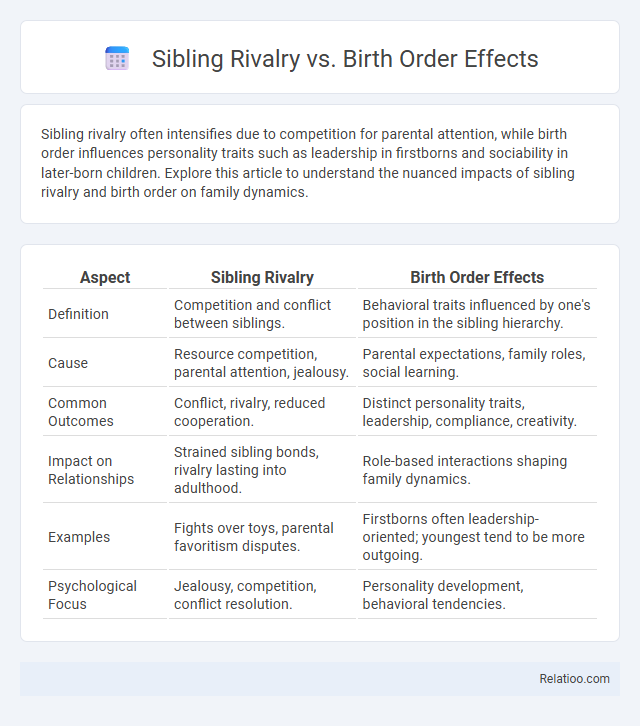Sibling rivalry often intensifies due to competition for parental attention, while birth order influences personality traits such as leadership in firstborns and sociability in later-born children. Explore this article to understand the nuanced impacts of sibling rivalry and birth order on family dynamics.
Table of Comparison
| Aspect | Sibling Rivalry | Birth Order Effects |
|---|---|---|
| Definition | Competition and conflict between siblings. | Behavioral traits influenced by one's position in the sibling hierarchy. |
| Cause | Resource competition, parental attention, jealousy. | Parental expectations, family roles, social learning. |
| Common Outcomes | Conflict, rivalry, reduced cooperation. | Distinct personality traits, leadership, compliance, creativity. |
| Impact on Relationships | Strained sibling bonds, rivalry lasting into adulthood. | Role-based interactions shaping family dynamics. |
| Examples | Fights over toys, parental favoritism disputes. | Firstborns often leadership-oriented; youngest tend to be more outgoing. |
| Psychological Focus | Jealousy, competition, conflict resolution. | Personality development, behavioral tendencies. |
Understanding Sibling Rivalry
Sibling rivalry often intensifies due to perceived birth order effects, where firstborns may feel pressure to lead while younger siblings seek independence, heightening conflicts. Understanding sibling rivalry requires recognizing how individual personalities and family dynamics interact, influencing competitiveness, jealousy, and support among siblings. Your awareness of these nuanced differences helps foster healthier relationships and reduces ongoing tensions within the family.
Defining Birth Order Effects
Birth order effects refer to the psychological and behavioral differences observed among siblings based on their rank in the family, such as first-born, middle, or youngest child. These effects influence personality traits, leadership abilities, and social dynamics, differentiating how each sibling interacts with family members and forms their identity. Understanding birth order effects helps you navigate and manage sibling rivalry by recognizing the unique roles and expectations assigned to each child.
Psychological Roots of Sibling Rivalry
Sibling rivalry often stems from deep psychological roots such as competition for parental attention, feelings of jealousy, and differences in perceived favoritism. Birth order effects influence these dynamics by shaping personality traits and family roles, with firstborns typically seeking leadership and younger siblings often striving for individuality. Understanding the interplay between sibling rivalry and birth order helps reveal underlying emotional conflicts and attachment styles that shape sibling interactions.
How Birth Order Shapes Personality
Birth order significantly influences personality traits, with firstborns often exhibiting leadership qualities and responsibility, while younger siblings may develop social adaptability and creativity. Your position in the familial hierarchy interacts with sibling rivalry, intensifying competition for parental attention and shaping interpersonal dynamics. Understanding birth order effects can help you navigate and mitigate the challenges posed by sibling rivalry, fostering healthier relationships.
Comparing Sibling Rivalry and Birth Order Impact
Sibling rivalry primarily stems from competition for parental attention and resources, often intensifying conflicts among siblings regardless of their birth order. Birth order effects influence personality traits and behavior patterns, with firstborns typically exhibiting leadership qualities while later-born siblings may develop social adaptability. Comparing both, sibling rivalry reflects immediate relational dynamics, whereas birth order impacts tend to shape long-term psychological development and social roles.
Parental Influence in Rivalries and Roles
Parental influence plays a critical role in shaping sibling rivalry and birth order effects by assigning roles and expectations that impact each child's behavior and self-perception. Your approach to managing conflicts and reinforcing individual strengths can either exacerbate rivalries or promote healthy sibling relationships. Understanding how birth order influences personality traits allows parents to tailor their guidance and reduce competition among siblings.
Cultural Differences in Sibling Dynamics
Cultural differences significantly shape sibling rivalry and birth order effects, influencing family dynamics and individual behavior patterns. In collectivist societies, sibling rivalry tends to be less pronounced due to strong emphasis on family cohesion and interdependence, contrasting with individualistic cultures where competition and birth order-related roles are more evident. Research indicates that cultural context moderates how birth order impacts personality traits and sibling interactions, highlighting the importance of considering cultural frameworks in psychological and sociological studies of sibling relationships.
Long-Term Consequences on Adult Relationships
Sibling rivalry and birth order effects significantly influence the long-term consequences on adult relationships, shaping personality traits and interpersonal dynamics. While sibling rivalry often leads to unresolved conflict patterns, birth order impacts roles such as leadership, responsibility, or rebellion within family hierarchies. Understanding these factors helps you navigate and improve your adult relationships by recognizing ingrained behaviors rooted in early family interactions.
Strategies to Manage Sibling Conflict
Effective strategies to manage sibling conflict hinge on understanding the nuances between sibling rivalry and birth order effects, as each factor influences behavior differently. You can implement age-appropriate conflict resolution techniques, promote individual attention, and encourage cooperative activities to reduce rivalry and minimize birth order tensions. Consistent communication, setting clear boundaries, and rewarding positive interactions foster a supportive environment that mitigates sibling rivalry and birth order-based conflicts.
Future Research Directions on Sibling Dynamics
Future research on sibling dynamics should explore the nuanced interplay between sibling rivalry and birth order effects, emphasizing how these factors uniquely shape personality development and interpersonal skills. Longitudinal studies can provide insights into how rivalry evolves with age and varying family structures, while also investigating cultural influences on sibling interactions. Your understanding of these dynamics can be enhanced by examining genetic, environmental, and psychological variables that contribute to sibling relationships over time.

Infographic: Sibling Rivalry vs Birth Order Effects
 relatioo.com
relatioo.com